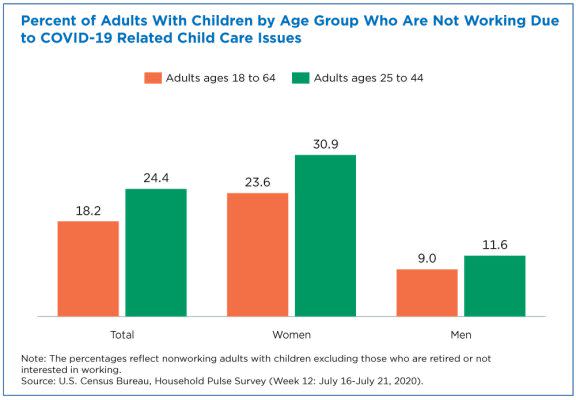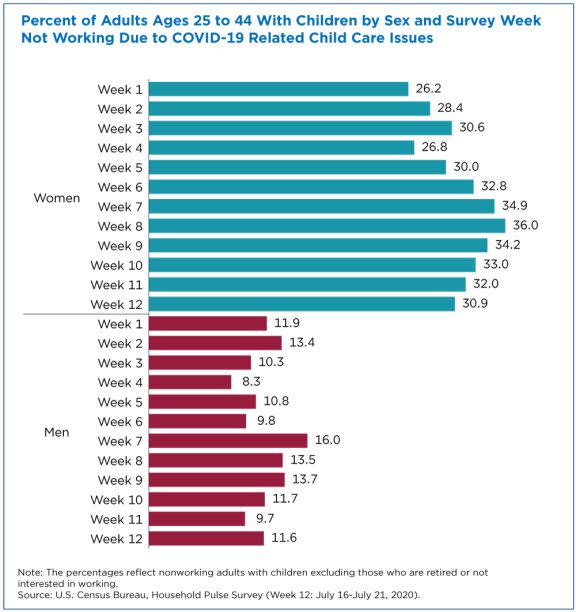1 in 4 women with kids stayed out of work due to childcare amid pandemic, study finds
The pandemic has left many mothers with two bad choices: Juggle a job and extra child care duties or quit altogether to free up time.
Many are choosing the second option.
Nearly 1 in 4 mothers said they are staying out of work because they have to take care of their children, according to an analysis by the Census Bureau. But for fathers, fewer than 1 in 10 are choosing child care over their job.
Read more: Here's how far women have come in the workplace — and where they still need to go
On top of that, women living in states with early stay-at-home orders were 53% more likely to take leave than mothers in late closure states, according to a paper by the Federal Reserve. There was no effect on working fathers or working women without school-aged children.

The situation is yet another blow the pandemic has dealt to female workers, who have been particularly hurt by job losses compared to previous recessions. The consequences could affect their future success in their careers.
“If they wouldn't have had the child care issues, they would have been working. But because they didn't have child care, they left the labor force,” said Misty Heggeness, principal economist at the U.S. Census Bureau, told Yahoo Money. “We've done a lot to tackle gender inequality in formalized areas of society, like the workplace, but the household is one that we talk about a lot less.”
‘Inequalities that exist in the more private spheres of our lives’
Not only were women more likely to stay out of work at the beginning of school closures, but that rate increased as time went on, while it slightly decreased for men.
“Over time, women were more and more likely to say that they weren't working due to childcare issues, and the rates didn't change for men,” Heggeness said.
Initially, 1 in 4 women between 25 and 44 with children stayed out of work because of child care issues. That number increased to nearly 1 in 3 three months later. Just over 1 in 10 men in the same age group and who had children were out of work because of child care. That number slightly decreased three months later.

“It's going to be really hard for women to achieve equality with men in the workforce if we don’t tackle the inequalities that exist in the more private spheres of our lives,” Heggeness said. “We have a lot of working mothers who are not able to participate in the labor force at their maximum potential because of child care.”
‘Not allowing one half of the population to live up to its full potential’
Regular recessions typically hurt men’s employment more severely than women’s. But that has not been the case in this pandemic, which is posing a threat to women’s gains in the workforce.
Due to social distancing measures, sectors with high female employment — like service occupations such as restaurants and hospitality — suffered some of the worst job losses, an April paper by the National Bureau of Economics found.
On top of that, schools and daycare closures have increased child care needs at home, largely impacting working mothers.

“In this pandemic you really see the inequalities within the household get exacerbated,” Heggeness said. “That has ripple effects in the labor market. That has ripple effects in women's ability to achieve leadership roles.”
Women accounted for 49.7% of non-farm payroll jobs in July or almost half of the U.S. workforce, according to data by the Labor Department. But still they face a gender pay gap and lack of representation in leadership positions.
“Some people who are really focused on traditional gender norms will say ‘Women should be taking care of their children anyway,’” Heggeness said. “But if you believe in that, you're doing it at the detriment to economic growth, because you're not allowing one half of the population to live up to its full potential.”
Denitsa is a writer for Yahoo Finance and Cashay, a new personal finance website. Follow her on Twitter @denitsa_tsekova.
Read more:
Analysis: 1 in 3 jobless Americans could be left out of Trump's action on unemployment
Even as GDP tanked, personal income grew thanks to government support
Read more personal finance information, news, and tips on Cashay
Follow Yahoo Finance on Twitter, Facebook, Instagram, Flipboard, SmartNews, LinkedIn, YouTube, and Reddit.

 money
money 
